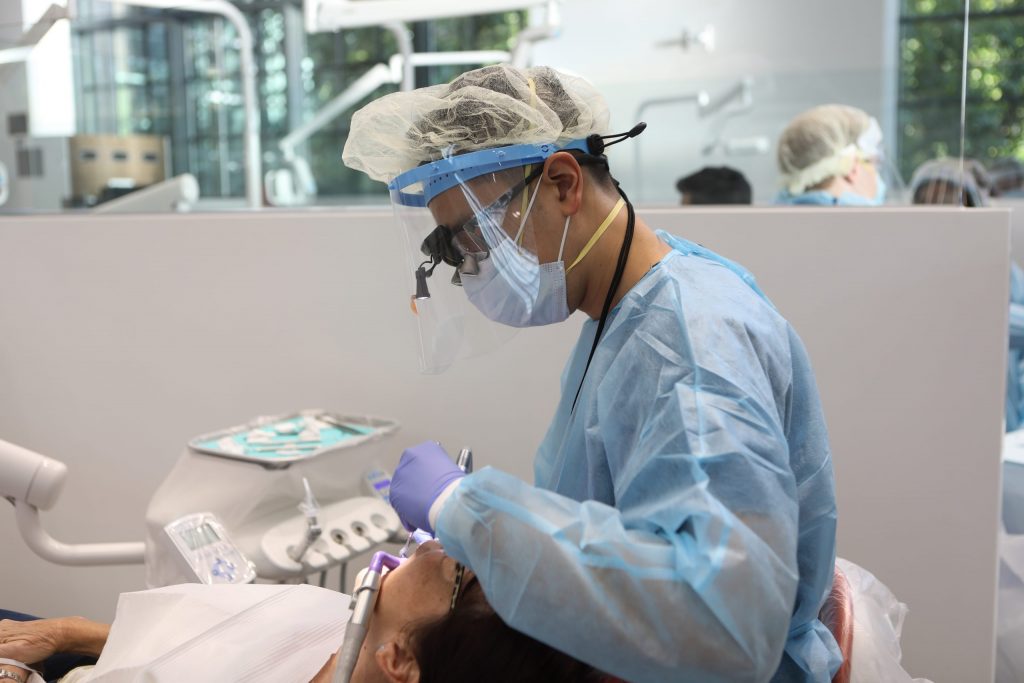Information Library
Start Reading

Bad breath, also known as halitosis or morning breath, stinks! It’s a common condition that affects many people around the world—about 25%. If this bad smell comes from your mouth, it can be an embarrassing problem that can negatively impact social and professional interactions and also affect your confidence.
Fortunately, if you think you may suffer from halitosis, Penn Dental Medicine has good news about bad breath causes and treatment options. Read on for fresh breath information and solutions here.
 Halitosis can originate from the mouth, nose, or throat. Bad breath symptoms include:
Halitosis can originate from the mouth, nose, or throat. Bad breath symptoms include:
If you are experiencing any of these symptoms, it is important to speak with a health-care professional or dental provider to determine the underlying cause and seek appropriate treatment.
If you suspect that you may have bad breath, a simple self-test can be performed at home. The “lick test” involves licking your wrist and waiting approximately 10 seconds for the saliva to dry. Then, smell the area of the lick. If there is an unpleasant odor present, it may indicate that you have bad breath. Additionally, ask a trusted friend or family member for their opinion.
 What Causes Bad Breath?
What Causes Bad Breath?The most common bad breath cause is poor oral hygiene, which allows bacteria to accumulate on the teeth, gums, and tongue. Other potential causes of bad breath include:
It is important to note that some medical conditions, such as diabetes, kidney failure, and liver disease, can also cause bad breath.
Your dentist may conduct several tests to determine the cause. One of the most common methods is the “sniff” test, where the dentist smells the patient’s breath. They may also ask the patient to breathe into a specialized device that detects the levels of sulfur compounds in the breath. In some cases, they may even take a sample of the bacteria that cause bad breath from the tongue or throat.
By identifying the underlying cause of bad breath, your dentist can recommend the proper treatment, whether it’s through improving oral hygiene, addressing an underlying health condition, or other means.
There are several treatments available that can effectively manage and eliminate bad breath.
 If you have persistent bad breath that does not improve with basic oral hygiene practices, it may be time to see your Penn Dental Medicine dentist. Additionally, if your bad breath is accompanied by other symptoms like pain or swelling in the mouth, difficulty swallowing, or a fever, it is important to seek medical attention right away.
If you have persistent bad breath that does not improve with basic oral hygiene practices, it may be time to see your Penn Dental Medicine dentist. Additionally, if your bad breath is accompanied by other symptoms like pain or swelling in the mouth, difficulty swallowing, or a fever, it is important to seek medical attention right away.
At Penn Dental Medicine, we’ll help you get your fresh breath back with dentist halitosis treatments. Or, we’ll provide instructions for treatments you can do yourself. Either way, we’ll sweeten your smile soon. So if you think you’re suffering from bad breath or if a family member’s morning breath seems to last all day, we’re ready to help. To schedule your appointment, call our office at 215-898-8965 or complete this form.
If you’d like to learn more about our services before your visit, just fill out this form to download “Comprehensive Care and You: Penn Dental Medicine’s Dental Services.”